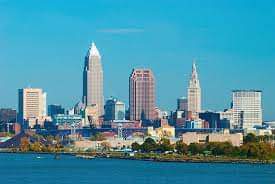It’s the end of the first semester of my Masters program and I plan to maximize the holiday for rest, leisure, some work and of course, learning! Allah in many verses of the Qur’an encourages us to travel the earth for several beneficial purposes. Amongst other reasons for travel, the Qur’an encourages travel that aims to visit new places as a means of learning: “Do they then not travel through the earth, so that their minds gain wisdom and their ears thus learn to hear?” (Qur’an 22:46)
“Have you not seen the ships speeding through the sea, carrying God’s provisions so that He might show you some of His wonders? Herein, behold, there are messages indeed for all who are patient, grateful.” (Q 31:31)
Hence, my husband and I decided to go on a road trip through the Midwest towards North-Eastern America. Expectedly, it was an opportunity to see places, learn and reflect on the bounties of Allah. As our bus snaked its way through various American cities, for every major city where we had a stop, from South Bend to Toledo, Akron, Cleveland, Baltimore, thanks to Google, my husband and I would browse information about the city to learn more about it beyond mere seeing it.
While there is a lot to learn from these different cities, one of them stood out to me, and that is Cleveland, Ohio. We got to this city in the evening, and it was really beautiful, with its tall and gigantic buildings, and the lights lighting up the night. It also has a very good road network such that we would be riding on a bridge, but could see three levels of road networks below us and another one above us. The skyline is indeed fascinating, but to our surprise, when we checked it out on Google, we realized that Cleveland was ranked “the most miserable city in the US” in 2010, and 27th most miserable in 2019. Even though it has improved, it is still among the 50 most miserable cities in America even in 2021.
It appeared like an oxymoron as it felt almost unbelievable that such a beautiful city would be considered a miserable place to live in. I checked the metrics for the ratings and realized that they were: crime rates, the percentage of people working, median household incomes, the percentage of people without healthcare, median commute times, and the number of people living in poverty.
With this experience, I learnt that people hardly really care about gigantic buildings and beautiful architecture. These aesthetics are good as they spice up our life, but they only add to the utility when basic needs have been fulfilled. What is the essence of magnificent buildings if I do not feel safe, or my child cannot access good healthcare? In fact, one of the latest rankings based on residents’ opinions reviewed the happiness score of all 383 metro areas in the U.S.
The index measures communities’ overall health based on 10 domains. Five represent individual well-being factors: physical, community, social relationships, financial, and sense of purpose. Another five are social determinants of health: health care access, food access, resource access, housing and transportation, and economic security.
This got me thinking about what actually matters to people and I quite agree that the above indices certainly matter more to individuals than superficial rankings based only on infrastructure or other such indices. And this happens on very basic levels as well.
I have been thinking long and hard on this discrepancy over the last few days and I keep asking myself: “what really matters in life?” As a daughter, sister, wife, mother, what really matters? Would my kids really care about us living in a 5-bedroom duplex if I was constantly absent due to work, or would they rather appreciate the quality time I spent with them? As an individual, what really matters to you? Beyond the superficial, beyond what people would hail you for, what really matters to you? What gives you joy, happiness and fulfilment? If you were told that you had exactly one month left to live, what would you do with it? Those are definitely the things that matter most.
Another perspective is prioritizing the akhira (hereafter) over the dunya (worldly life). I think about people who are beautiful on the outside, but rotten on the inside. These are people who present a beautiful version of themselves to the world, considered role models even, but in secret engage in evil deeds! What would really matter on the Last Day? Definitely not the fancy degrees, exotic cars, gigantic mansions, or beautiful clothes! How would you not be a “Cleveland” on the Day of Accountability; beautiful on the outside – loved by many, hailed by all, but empty on the inside – bereft of good deeds worthy of presenting on the Last Day.
May Allah make us beautiful beings inside out, grant us the best of deeds in open and secret, and make what is hidden about us more beautiful than what is known of us.
– Haleemah writes from South Bend, Indiana





